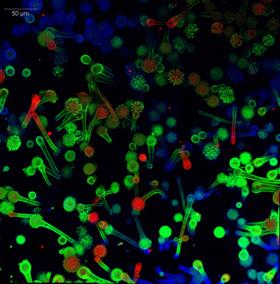Scientists at the Institut Pasteur, Radboudumc university medical center (The Netherlands), and the University of Perugia (Italy), recently identified the mechanism by which a component of the cell wall of the pathogenic fungus Aspergillus fumigatus triggers an anti-inflammatory effect. They then showed that this same component could be used as a potential treatment for various inflammatory diseases. Their work also opens up new avenues of research for the development of therapeutic solutions to combat invasive, and often fatal, aspergillosis. This work was published march 6, 2014 in the medical journal PLoS Pathogens.
Press release
Paris, March 7, 2014

Recently, the Aspergillus Unit at the Institut Pasteur, led by Jean-Paul Latgé, identified an Aspergillus fumigatus molecule with powerful anti-inflammatory properties. The molecule, galactosaminogalactan or GAG, is a polysaccharide (sugar polymer) found in the fungus' cell wall.
In this new study, the Institut Pasteur team in collaboration with an italian team led by Luigina Romani and a dutch team led by Frank van de Veerdonk, precisely describes, both in mice models and in vitro using several human immune system cells, the action mechanism of the GAG polysaccharide that triggers this anti-inflammatory effect.
The scientists showed that the GAG polysaccharide inhibits the activities of interleukin 1 (IL-1), a major molecule responsible for activating the immune system when attacked by a pathogenic agent. It does this by synthesizing a protein that effectively replaces IL-1 on its receptor. This protein, called IL1-RA (IL1 receptor antagonist), prevents IL-1 from sending its signal to cells involved in the body’s defense mechanism. They also showed that mice lacking IL1-RA are resistant to invasive aspergillosis, which opens up new avenues of research for the development of treatments to combat invasive aspergillosis through the targeting of IL1-RA.
In addition, using colitis (inflammation of the colon) as an experimental model, the scientists observed that they could cure inflammation by administering the GAG polysaccharide. This leads them to believe that the molecule’s anti-inflammatory properties might also be used to treat inflammatory and auto-immune diseases involving IL-1, notably gout and rheumatoid arthritis.
--
Illustration - © Institut Pasteur
Caption - Airborne Aspergillus fumigatus conidial heads
Source
A polysaccharide virulence factor from Aspergillus fumigatus elicits anti-inflammatory effects through induction of interleukin-1 receptor antagonist, PLoS Pathogens, 6 mars 2014.
Mark S. Gresnigt (1,2), Silvia Bozza (3), Katharina L. Becker (1,2), Leo A. B. Joosten (1,2) , Shahla Abdollahi-Roodsaz (2,4), Wim B. van der Berg (2,4), Charles A. Dinarello (1,5), Mihai G. Netea (1,2), Thierry Fontaine (6), Antonella De Luca (3), Silvia Moretti (3), Luigina Romani (3), Jean-Paul Latge (6), Frank L. van de Veerdonk (1,2)
(1) Department of Medicine, Radboud University Medical Center, Nijmegen, The Netherlands
(2) Institute for Infection, Inflammation, and Immunity (N4i), Nijmegen, The Netherlands
(3) Microbiology Section, Department of Experimental Medicine and Biochemical Sciences,
University of Perugia, Perugia, Italy
(4) Department of Rheumatology, Radboud University Medical Center, Nijmegen, The
Netherlands
(5) Department of Medicine, University of Colorado Denver, Aurora, CO, USA
(6) Unité des Aspergillus, Institut Pasteur, Paris, France
Contact presse
Service de presse de l’Institut Pasteur
Jérémy Lescène - Jeremy.lescene@pasteur.fr - +33 (0)1 45 68 81 01
Nadine Peyrolo - nadine.peyrolo@pasteur.fr - +33 (0)1 45 68 81 47


